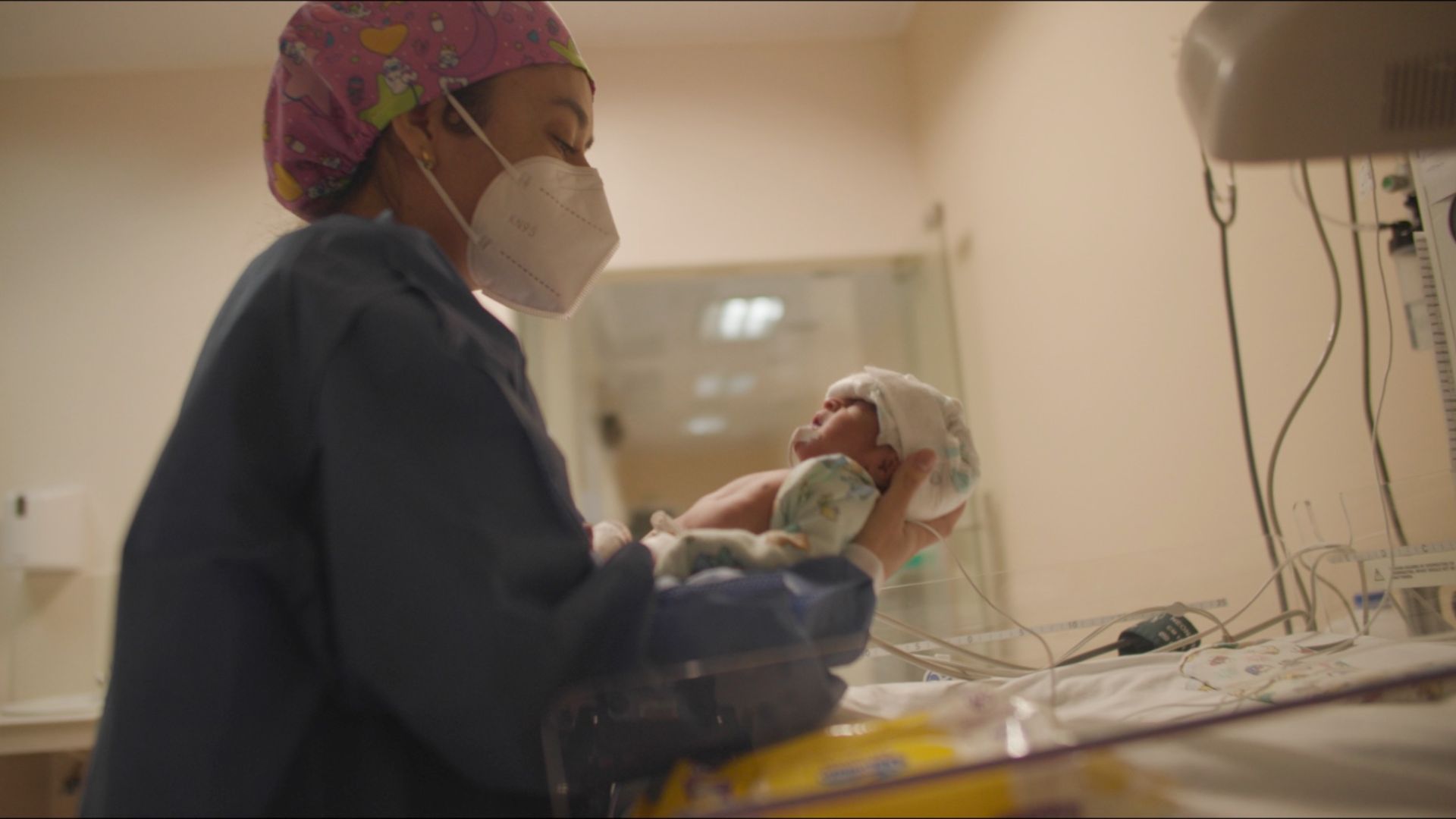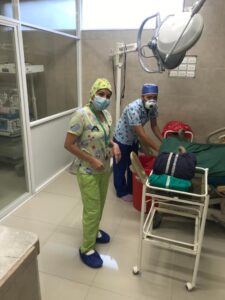
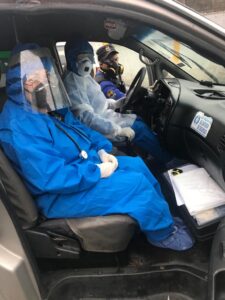
December 11, 2020
Click here for AHD’s Winter Newsletter to read a full update on AHD’s response to the pandemic.
November 22, 2020
Andean Health’s doctors published this article this week on Covid-19 in Ecuador in the American Journal of Tropical Medicine & Hygiene. Please read this to learn about how the pandemic unfolded for Ecuador. The authors tell the story of the devastating turn of events in Guayaquil and then throughout the country.
September 16, 2020
See the Fall Newsletter update here.
July 27, 2020
As most of you know, COVID wreaked havoc on our large port city of Guayaquil in April and May. It then began to spread gradually throughout the country. Some cities and towns it hit rather hard. Quito has finally felt the effects of COVID in a very significant way in June. Hospitals are full, and people are dying there the way they did in Guayaquil, at home or in the streets, according to many healthcare workers we know and with whom we communicate regularly.
Locally, Santo Domingo is beginning to live the same tragedies as Guayaquil, with folks dying on the streets as well. Hospitals are full in Santo Domingo.
At Hospital Hesburgh, we are seeing COVID patients regularly and now admitting the ones requiring hospitalization. This process is extremely complicated due to the unavailability of appropriate testing. Those not requiring hospitalization are sent home for quarantine, but poverty and difficult living conditions make that quarantine challenging, to say the least.
Hospital PVM is also now admitting sick COVID patients. We have created an isolation ward in our emergency department for them, as we manage most emergencies in our triage tents. Both hospitals are running at about 25% of capacity.
We are planning to open limited outpatient services in August to help our patients with chronic conditions such as diabetes, hypertension, depression, and arthritis, among others. We believe that COVID will become an endemic problem in Ecuador to which people will have to grow accustomed in some way. Anti-COVID therapies are not yet approved. If a vaccine should become available, we suspect it will take much longer to percolate down to rural Ecuador. Optimism needs to be balanced with a realistic approach.
We continue to require significant amounts of PPE – even more than before as we accept COVID patients for admission. We also hope that a point of care COVID test becomes available soon to help with decision-making, but we see little on the horizon, currently.
As always, thank you for supporting our work.
– David
June 1, 2020
Click here for AHD’s Summer Newsletter to read a full update on AHD’s response to the pandemic.
May 12, 2020
Many of you by now have read the WSJ and NYT articles on the chaos of Guayaquil. That wave seems to be slowly making its way peripherally but with much less aggression than in troubled Guayaquil. Rural areas seem to be less affected, and the provincial roadblocks, coupled with the lockdown, seems to have slowed transmission.
In Pedro Vicente Maldonado (PVM), we are seeing presumptive cases of COVID in our triage tents. Just yesterday an elderly man with hypertension was in Quito for a few weeks and his wife was hospitalized three days ago and tested positive. He returned to the countryside, but yesterday developed fever and some mild shortness of breath, and was saturating his blood with oxygen at only 90%. A rather typical presentation. His situation is actually alarming, as he could easily progress rapidly to respiratory failure. We transferred him to Quito, and somehow, magically, they found a bed for him at a public hospital.
We also continue to see non-COVID patients at PVM, but volumes are considerably lower as people are actively avoiding hospitals and health centers, as in the United States and elsewhere. We continue to do telephone consults for our patients and we are also delivering “care packages” to families in critical situations.
In Santo Domingo there seems to be more COVID transmission for obvious reasons of overcrowding. HH continues to coordinate with the MOH to receive critical care patients in the ICU and some COVID patients in our hospital wing with isolation and negative pressure rooms. They too are doing phone consults and delivering food packages to the destitute.
In both hospitals the outpatient facilities remain closed. Our triage tents in both facilities are active and managing all ER patients. Road accidents (thankfully) have come to grinding halt as lockdown persists and few vehicles are on the road.
PVM has closed all roads into town with the exception of one, where they are screening everyone that passes that point.
Our new, cloud-based electronic medical record software is now fully functional at both hospitals. That process, as expected, was not unlike giving birth to a 10 lb baby, but here we are! The low patient volumes functioned like Pitocin and made the delivery just a pinch easier. It is a spectacular system we designed and created with our team. We can even use it on our smartphones.
We are helping any way we can during this crisis but trying to pinch pennies as much as possible, anticipating it might be awhile before we see some government reimbursements, yet we remain hopeful.
On a personal note, Elizabeth and Sophia are fine and there have been limited domestic riots since the lockdown, thankfully. I continue to work in PVM Monday through Thursday. Diego is running things in HH.
Stay well and thank you!
David
May 6, 2020
Dear Andean Health Family,
While people in the U.S. can monitor numbers of cases and deaths in great detail on a daily basis, we in Ecuador are largely blind to the extent that the virus has infiltrated the country. We do know that Ecuador’s largest city has had thousands of COVID-19 deaths and that the Ministry of Health hospital in Santo Domingo is full of COVID-19 patients.
Yet, we haven’t yet seen a huge influx of COVID-19 patients at our hospitals in rural Ecuador. We aren’t sure why but think it could be due to the shut down of the transportation system, and also to the cultural hesitancy to bring patients to hospitals unless the family can stay there with them. With no reliably effective treatment available, we are worried that people are deciding to just keep their sick loved ones at home.
Of course this could all change tomorrow, and we could be overwhelmed with COVID-19 patients. In the meantime, in addition to trying to stay as prepared as possible for any influx, we are working hard to make sure that we are doing our best to be helpful to the communities where we serve during this health (and economic) crisis.
Some of the things we are doing include:
- We are meeting regularly with Ecuador’s Ministry of Health to coordinate the regional health care response to the pandemic and to assure that we are fully supporting and participating in the relief effort.
- We are taking the Ministry of Health’s overflow COVID-19 and non-COVID-19 patients in Hesburgh Hospital’s ICU and isolation ward. The Ministry of Health hospitals are full and completely overwhelmed.
- In Pedro Vicente Maldonado, we are reaching out to our chronic illness patients through telephone calls to provide consultation and to refill prescriptions.
- We secured a new public contract in Santo Domingo to take Social Security patients.
- Our doctors have conducted 200 complimentary telemedicine consults in Santo Domingo and 100 in Pedro Vicente Maldonado. These are critical since the bus system is shut down, and there is a 2pm curfew every day in the region.
- Our staff has prepared care packages of grocery items for the poorest of the poor in our communities. Those who were already vulnerable now face extreme poverty and food security issues.
This is all a work in progress, and things could change drastically in a week. I’m happy to see that morale is fairly high at our facilities. Our staff members know they could be exposed, but they want to support the effort, and we are taking every measure possible to protect them.
There is so much uncertainty here due to the virus and economic collapse. People were already living a tenuous existence before the pandemic, so they didn’t have far to fall before their situations became truly dire. We can’t solve all of these problems, of course, but please know that we are doing our best to be there for our communities during this very difficult time. Thank you for supporting us.
Gratefully,
David Gaus, M.D.
April 23, 2020
- As you may have seen in the media, parts of Ecuador are being very hard hit. (See this article/video about Guayaquil’s situation, in which hundreds of bodies are lying in the streets.) But with very little testing, it is impossible to know how widespread the virus is in the rest of the country.
- We believe that it is spreading rapidly, but it is hard to tell because most people are choosing to keep their sick relatives at home. This is due in part to the shutting down of the bus systems in our communities and skepticism of the government’s handling of the pandemic. But it is also because of the growing, and not unreasonable fear that if people take their loved ones to the hospital, they will have to leave them there where they may die alone. Of course, keeping a sick family member in a small home with multiple generations of residents is a recipe for everyone becoming infected
- AHD’s Hesburgh Hospital has been designated by Ecuador’s Ministry of Health as a non-COVID-19 hospital. Therefore, we are receiving overflow, routine non-COVID-19 patients sent to us from the public sector’s facilities in the area that are completely overwhelmed with COVID-19 patients.
- In Pedro Vicente Maldonado (PVM), we have had some COVID-19 patients, and expect that as the virus progresses, more and more people will get themselves to our hospital.
- In order to make sure we are doing what we can to reach out to people in need, PVM’s doctors are providing complimentary telemedicine consults to patients in the community so they don’t have to come into the hospital. PVM staff are also delivering care packages and groceries to the elderly in the community who are the most vulnerable and isolated.
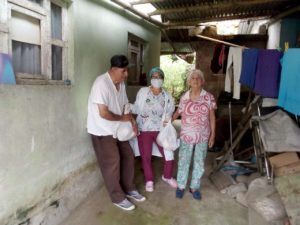
Thank you for supporting our work.
Read these other articles from AHD:
- Battling COVID-19 in a Poor Country: Ecuador’s Emerging Strategy
- Self-Sustainability in a Time of Global Pandemic (and Oil Price Collapse)
March 30, 2020
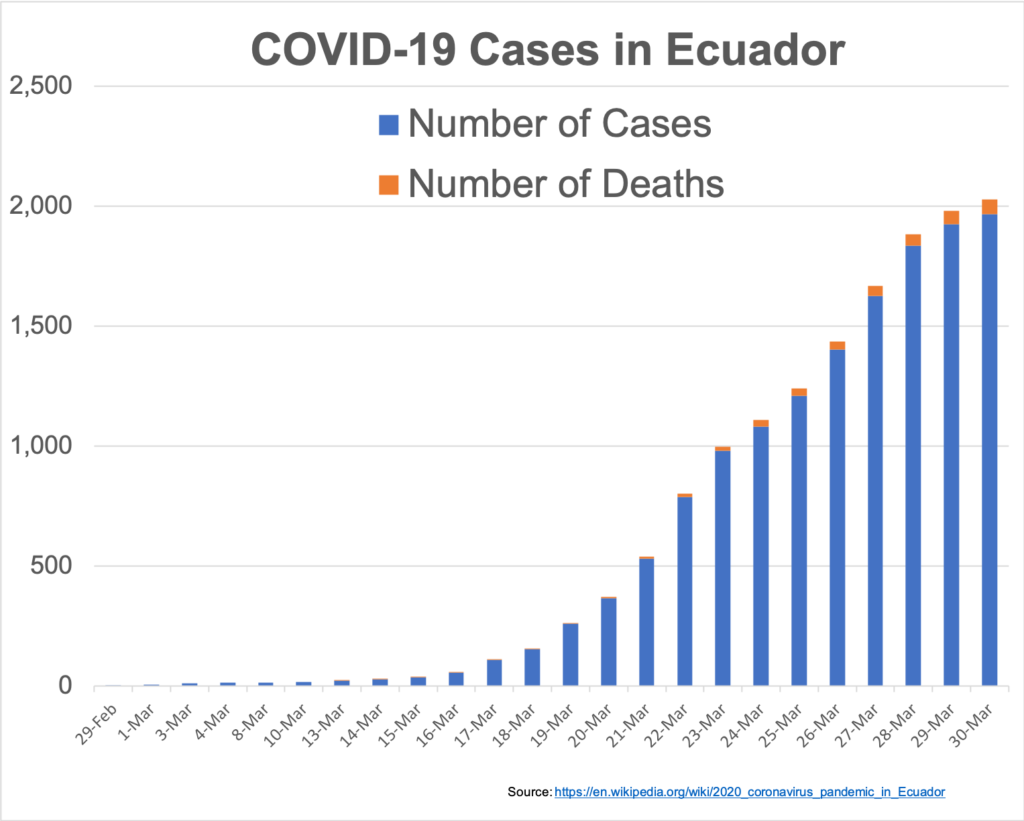
Dear Andean Health Family,
During this time of global uncertainty, my heart goes out to you and any loved ones who have been affected by COVID-19.
As of today, the country of Ecuador has 1,924 cases (the second most cases in South America after Brazil), and that’s with a very limited testing capability. We only have a few cases in the communities we serve, but we know a huge wave of patients is coming soon.
Our top priority is to continue to provide critically needed health care during this crisis. This will be impossible if we don’t protect our staff. This is particularly difficult in Ecuador because the country simply does not have enough personal protection equipment for us to supply our doctors and nurses appropriately.
So working closely with local health authorities, we have developed plans and protocols, and our medical professionals are ready. This includes:
-
All incoming patients at either hospital must go through triage tents we set up outside to ensure they don’t have COVID-19 symptoms.
-
Any suspected cases of COVID-19 will be sent to the public sector facilities in the region.
-
AHD will take overflow non COVID-19 cases from the Ministry of Health facilities, which are likely to be quickly overwhelmed by the volume of COVID-19 cases.
Essentially, the plan is for AHD to play the role of the big military hospital ships off the coasts of the U.S. We will be the overflow hospitals for the rest of the system in our regions so that they can focus on treating COVID-19 cases.
Like hospitals around the world, we are trimming back all non-essential services to be sure we have the capacity to handle the most seriously ill people. The outpatient areas are closed because the government has asked people not to come in for routine medical care. Only our ICU and hospital wards are open at Hesburgh Hospital. At Hospital Pedro Vicente Maldonado, we have cancelled scheduled surgeries, but have kept our Emergency Room and hospital ward open.
It is an open question as to whether our government partners will pay the bills they owe to us. Ecuador’s economy is essentially shut down now, and their already fragile fiscal situation worsened when oil prices plummeted at the end of February.
We recognize there is suffering everywhere around the globe, and that all of us are worried about our own family and friends, but please keep Ecuador in your hearts. We have started a COVID-19 emergency fund at AHD for these underserved people. Please consider donating.
Gratefully,
David Gaus
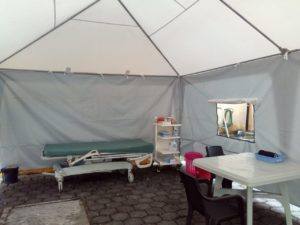
March 26, 2020
There are 1,211 confirmed cases today, and that is with limited testing available. AHD’s hospitals are prepared to receive the Ministry of Health’s overflow patients any day now.
March 23, 2020
Dear AHD Family,
Ecuador is suffering. The Minister of Health just resigned, and as of today, no additional public funding has been budgeted for this epidemic. Frankly, I’m stunned at their complete lack of response regarding resources and funding given that we’re on lockdown and our borders are closing. The number of cases double daily down here, and that’s only what we know from limited testing capability. The public sector will soon be overwhelmed. Our medical staff is prepared, and we have protocols in place. We recognize there is suffering everywhere around the globe, but please keep Ecuador in your thoughts. We have started a COVID-19 emergency fund for these underserved people. Please consider donating.
David
March 12, 2020
Dear AHD Family,
Coronavirus is here in Ecuador. Given the community transmission that we’ve seen in other countries, there is a high probability that it will spread fast in a low-resource setting like Ecuador. Hygiene in Ecuador is not nearly at the level of the United States.
We are preparing ourselves to collaborate with the federal government and social security system to help manage patients in our catchment areas. If this does become a major public health problem, the public system will collapse quickly. We have set up tents outside our hospitals to triage patients as to keep them separated from the other patients in the lobbies and waiting rooms. We have protocols in place for our medical professionals.
Although global health is much more than epidemics, this is a situation where we need to step up and do our part. I know you all would agree. The crisis is a reminder of how important it is to develop health systems in low-income countries like Ecuador so they can be prepared for such emergencies.
We will be posting updates to this page periodically.
Thank you for supporting our work.
Gratefully,
David
